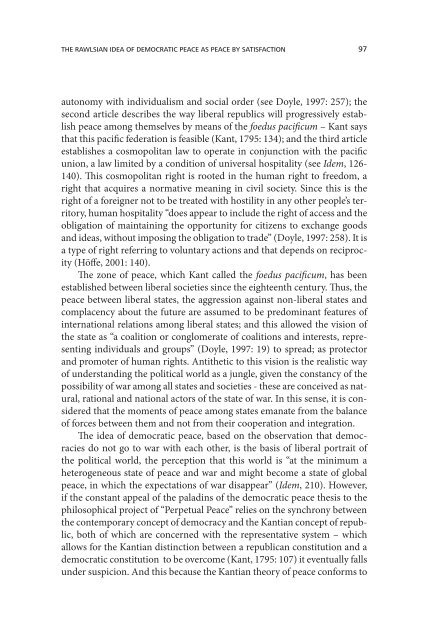Diacritica 25-2_Filosofia.indb - cehum - Universidade do Minho
Diacritica 25-2_Filosofia.indb - cehum - Universidade do Minho
Diacritica 25-2_Filosofia.indb - cehum - Universidade do Minho
You also want an ePaper? Increase the reach of your titles
YUMPU automatically turns print PDFs into web optimized ePapers that Google loves.
THE RAWLSIAN IDEA OF DEMOCRATIC PEACE AS PEACE BY SATISFACTION<br />
autonomy with individualism and social order (see Doyle, 1997: <strong>25</strong>7); the<br />
second article describes the way liberal republics will progressively establish<br />
peace among themselves by means of the foedus pacifi cum – Kant says<br />
that this pacifi c federation is feasible (Kant, 1795: 134); and the third article<br />
establishes a cosmopolitan law to operate in conjunction with the pacifi c<br />
union, a law limited by a condition of universal hospitality (see Idem, 126-<br />
140). Th is cosmopolitan right is rooted in the human right to free<strong>do</strong>m, a<br />
right that acquires a normative meaning in civil society. Since this is the<br />
right of a foreigner not to be treated with hostility in any other people’s territory,<br />
human hospitality “<strong>do</strong>es appear to include the right of access and the<br />
obligation of maintaining the opportunity for citizens to exchange goods<br />
and ideas, without imposing the obligation to trade” (Doyle, 1997: <strong>25</strong>8). It is<br />
a type of right referring to voluntary actions and that depends on reciprocity<br />
(Höff e, 2001: 140).<br />
Th e zone of peace, which Kant called the foedus pacifi cum, has been<br />
established between liberal societies since the eighteenth century. Th us, the<br />
peace between liberal states, the aggression against non-liberal states and<br />
complacency about the future are assumed to be pre<strong>do</strong>minant features of<br />
international relations among liberal states; and this allowed the vision of<br />
the state as “a coalition or conglomerate of coalitions and interests, representing<br />
individuals and groups” (Doyle, 1997: 19) to spread; as protector<br />
and promoter of human rights. Antithetic to this vision is the realistic way<br />
of understanding the political world as a jungle, given the constancy of the<br />
possibility of war among all states and societies - these are conceived as natural,<br />
rational and national actors of the state of war. In this sense, it is considered<br />
that the moments of peace among states emanate from the balance<br />
of forces between them and not from their cooperation and integration.<br />
Th e idea of democratic peace, based on the observation that democracies<br />
<strong>do</strong> not go to war with each other, is the basis of liberal portrait of<br />
the political world, the perception that this world is “at the minimum a<br />
heterogeneous state of peace and war and might become a state of global<br />
peace, in which the expectations of war disappear” (Idem, 210). However,<br />
if the constant appeal of the paladins of the democratic peace thesis to the<br />
philosophical project of “Perpetual Peace” relies on the synchrony between<br />
the contemporary concept of democracy and the Kantian concept of republic,<br />
both of which are concerned with the representative system – which<br />
allows for the Kantian distinction between a republican constitution and a<br />
democratic constitution to be overcome (Kant, 1795: 107) it eventually falls<br />
under suspicion. And this because the Kantian theory of peace conforms to<br />
<strong>Diacritica</strong> <strong>25</strong>-2_<strong>Filosofia</strong>.<strong>indb</strong> 97 05-01-2012 09:38:23<br />
97











![Programa [pdf] - cehum - Universidade do Minho](https://img.yumpu.com/17305425/1/190x135/programa-pdf-cehum-universidade-do-minho.jpg?quality=85)




